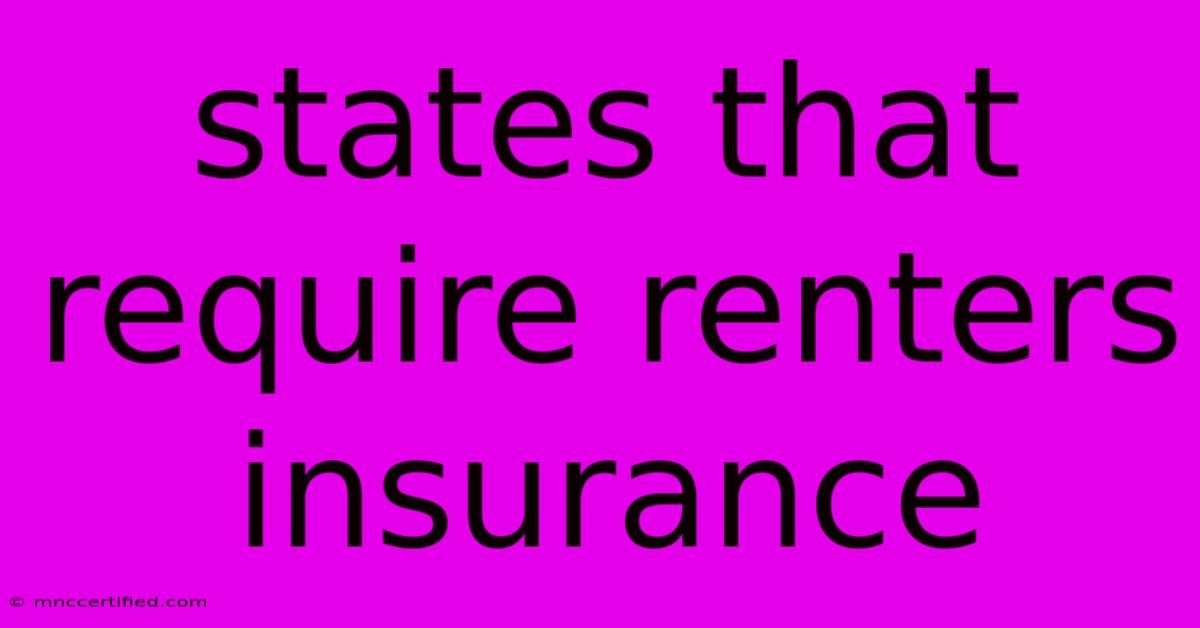States That Require Renters Insurance

Table of Contents
Do You Need Renters Insurance? A State-by-State Guide
Renters insurance is an essential form of protection for anyone who lives in a rental property. It provides financial coverage for your belongings in case of unexpected events like fire, theft, or natural disasters. While it's not mandatory in all states, many landlords require renters insurance as a condition of tenancy.
This guide will delve into the specific requirements for renters insurance in each state, helping you understand whether you need it and what to look for in a policy.
States That Require Renters Insurance
While no state mandates renters insurance for all tenants, several states have specific circumstances where it becomes mandatory:
-
Florida: Landlords are required to obtain and maintain flood insurance for properties located in designated flood zones. If a property is in a flood zone, the landlord can pass on the cost of the flood insurance to tenants by requiring them to obtain renters insurance that includes flood coverage.
-
New York: Renters insurance is required for tenants who live in buildings that have suffered a fire in the past five years, with the landlord having received a "Notice of Violation" from the Department of Buildings.
-
Texas: Many landlords in Texas have their own insurance policies that include liability coverage. These policies usually have a "waiver of subrogation" clause, meaning the landlord's insurer can't pursue claims against the tenant. As a result, many Texas landlords require renters insurance to ensure tenants have adequate coverage for their belongings.
States Where Renters Insurance is Commonly Required by Landlords
While not mandated by law, many landlords in these states often require renters insurance:
-
California: Landlords may request renters insurance, especially in high-risk areas prone to natural disasters like earthquakes or wildfires.
-
Illinois: Many landlords in Illinois require renters insurance as a condition of lease agreements, especially in urban areas with high crime rates.
-
Maryland: Renters insurance is often required in Maryland, particularly in densely populated areas with high property values.
-
Massachusetts: Similar to Maryland, landlords in Massachusetts often require renters insurance, especially in areas prone to property damage from natural disasters or theft.
-
New Jersey: Renters insurance is common in New Jersey, especially in areas with a high cost of living and significant property values.
-
Pennsylvania: Many landlords in Pennsylvania, particularly those with older buildings, require renters insurance to protect themselves from potential liability claims.
-
Washington: Landlords in Washington may require renters insurance, particularly in areas with a high risk of natural disasters like earthquakes or wildfires.
Understanding Your Lease Agreement
The best way to determine whether you need renters insurance is to carefully review your lease agreement. The lease should clearly state whether renters insurance is required. If it's not explicitly mentioned, it's best to ask your landlord directly.
Benefits of Renters Insurance
Even if your landlord doesn't require it, renters insurance provides numerous benefits, including:
-
Protection for your belongings: Covers your personal property against loss or damage due to fire, theft, vandalism, natural disasters, and more.
-
Liability coverage: Protects you financially if someone is injured on your property, even if it's not your fault.
-
Additional living expenses: Helps cover temporary housing costs if you're displaced from your apartment due to a covered event.
-
Peace of mind: Gives you the assurance that your belongings and your financial well-being are protected in case of unforeseen events.
Finding the Right Renters Insurance Policy
Once you determine that renters insurance is necessary, it's essential to compare different policies and choose one that best suits your needs. Factors to consider include:
-
Coverage limits: Choose a policy with sufficient coverage to protect the value of your belongings.
-
Deductibles: A higher deductible generally means lower premiums, but you'll have to pay more out-of-pocket in case of a claim.
-
Additional coverages: Some policies offer optional coverages like identity theft protection, water damage, or earthquake coverage.
-
Price: Shop around for the best rates and make sure to compare apples to apples when considering different policies.
Conclusion
While not required in all states, renters insurance is an essential protection for anyone who lives in a rental property. By understanding the specific requirements in your state and your lease agreement, you can make an informed decision about whether renters insurance is right for you.

Thank you for visiting our website wich cover about States That Require Renters Insurance. We hope the information provided has been useful to you. Feel free to contact us if you have any questions or need further assistance. See you next time and dont miss to bookmark.
Featured Posts
-
Where To Watch Colorado Vs Texas Tech Game
Nov 10, 2024
-
Week 11 Game Michigan Vs Indiana Live Scores And Highlights
Nov 10, 2024
-
Insurance Companies In Clarksville Tn
Nov 10, 2024
-
Bonding Companies In Savannah Georgia
Nov 10, 2024
-
Flanagans Hair Transformation Extensions
Nov 10, 2024